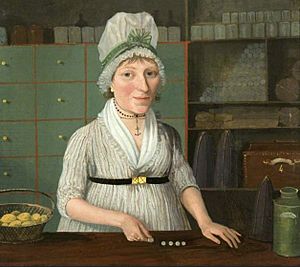Nation of shopkeepers facts for kids
The saying "a nation of shopkeepers" is a well-known phrase. It is often used to describe England or the United Kingdom. Many people think Napoleon first said it. However, this idea is not entirely true. The phrase was used even before Napoleon's time.
Contents
Britain's Economic Strength
During Napoleon's time, Britain was becoming very powerful. It was known more for its trade and strong navy. It was also changing from a trading nation to an industrial one. This change helped Britain become a leading power after the Battle of Waterloo.
Even though Britain had fewer people than France during the Napoleonic Wars, its citizens earned more money. This meant the government could collect more taxes. These taxes helped pay for the long war against Napoleon. The Bank of England also printed special banknotes. This helped Britain's economy and its ability to fund the war.
Where Did the Phrase Come From?
The phrase "a nation of shopkeepers" might have been a common saying in the 1700s. Some believe Napoleon heard it from a French politician named Bertrand Barère de Vieuzac. Barère supposedly quoted Adam Smith.
Adam Smith's Idea
However, the phrase did not start with Napoleon or Barère. It first appeared in a book called The Wealth of Nations (1776) by Adam Smith. Smith was a famous Scottish economist. He wrote about how countries become wealthy.
Smith used the phrase to talk about trade and empires. He said:
To found a great empire for the sole purpose of raising up a people of customers may at first sight appear a project fit only for a nation of shopkeepers. It is, however, a project altogether unfit for a nation of shopkeepers; but extremely fit for a nation whose government is influenced by shopkeepers.
—Adam Smith, The Wealth of Nations
In an earlier version, Smith also said Britain was "a nation that is governed by shopkeepers." He likely wasn't talking about small store owners. Instead, he meant a country focused on trade and business.
Other Early Uses
The phrase has also been linked to Samuel Adams, an American statesman. But this is not certain.
Another person, Josiah Tucker, a religious leader, used a similar idea in 1766. He wrote:
And what is true of a shopkeeper is true of a shopkeeping nation.
Benjamin Franklin, an American Founding Father, used a similar thought about Holland in 1781. He wrote that Holland was "no longer a nation but a great shop." He felt it had "no other principles or sentiments but those of a shopkeeper."
How the Phrase Changed Meaning
When Napoleon supposedly used the phrase, it was meant to be an insult. He wanted to suggest Britain was only interested in money. However, over time, the phrase has been used in a positive way in Britain.
Modern Use
For example, Margaret Thatcher, a former British Prime Minister, used the phrase in 1975. She said:
We used to be famous for two things—as a nation of shopkeepers and as the workshop of the world. One is trade, the other is industry. We must get back our reputation.
She used it to remind people of Britain's strong history in trade and industry.
The writer William Makepeace Thackeray also used the phrase in his famous novel Vanity Fair (novel). This book was published in the 1840s. He used it to describe the British army in Belgium before the Battle of Waterloo. He wrote that the British soldiers "paid his way." He then added that this fact "surely becomes a nation of shopkeepers." Here, he used the phrase to show British honesty and good business sense.


